Quick Answer:
It is illegal to sell a car without a Title in all states. If you don’t have the document, you need to apply for a duplicate Title.
Some states offer exceptions for old vehicles where the Bill of Sale can be accepted instead of the Title.
Key Takeaways:
- Certificate of Title Requirement: In most states, a Certificate of Title is mandatory for selling a car. This legal document is essential for establishing ownership and is necessary for the transaction.
- Obtaining a Replacement Title: If the original Title is lost or was never transferred, there are various methods to obtain a new one. These include applying for a duplicate title at the DMV or acquiring a bonded title, especially if the vehicle was inherited or gifted without a Title.
- Understanding State-Specific Regulations: Each state has its own set of rules regarding the sale of vehicles without a Title. Some states allow exceptions for older vehicles, while others have stringent requirements. It’s crucial to check with the local DMV for specific state requirements and compliance guidelines.

| States that have exceptions |
|---|
| Iowa |
| Maine |
| Massachusetts |
| Montana |
| New Hampshire |
| Vermont |
Best Used Car Buyers
Peddle

Trustpilot Rating
Get a legit offer in minutes – provide VIN, mileage and condition
$0 fees + you don’t have to pay for towing – Peddle will take care of it
Get paid in check during the pick up for any car (damaged, junk)
Wheelzy

Trustpilot Rating
Quick car evaluation without the hassle – sell your car within 30 min
Choose a convenient date and time for free pick-up, even tomorrow
Get cash in hand the same day the Wheelzy agent picks up your car
Check If You Are Eligible for an Exemption
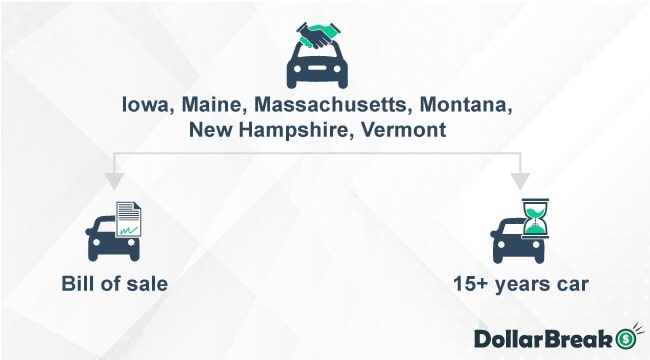
However, there are a few exceptions to these laws. For example, in some states, you may be able to sell a car without a title if you have a bill of sale and the vehicle is less than a certain age.
Exceptions apply in these states:
| State | Exception requirements |
|---|---|
| Iowa | Car age is 15 years or older, signed bill of sale |
| Maine | Car is 1995 or older, signed bill of sale |
| Massachusetts | Car age is 15 years or older, signed bill of sale |
| Montana | Car age is 25 years or older, signed bill of sale |
| New Hampshire | Car age is 15 years or older, signed bill of sale |
| Vermont | Car age is 15 years or older, signed bill of sale |
Even if you meet the requirements to sell a car without a title in these states, there may be additional directives that you need to meet. For example, you may need to get a bill of sale notarized, or you may need to pay a fee.
Penalties for Selling a Car Without a Title
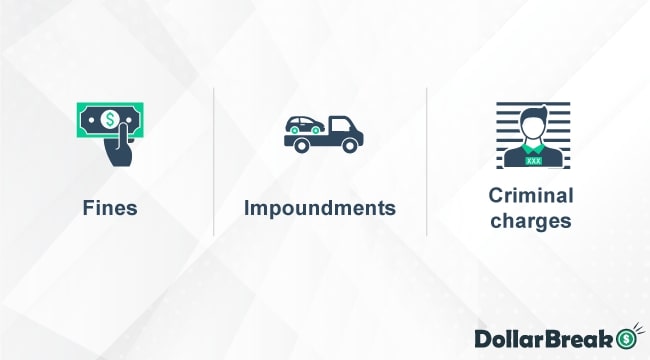
In most states, it is illegal to sell a car without a title. The penalties for doing so vary from state to state, but they can be severe. In some states, you could be fined, have your car impounded, or even be charged with a crime.
Penalties for selling a car without a title depend on each state’s laws. However, some common penalties include fines, impoundment and even criminal charges.
Examples of penalties for selling a car without a title:
- California – you could be fined up to $1,000 and/or have your car impounded
- Florida – could result in a fine of up to $500 and/or up to 60 days in jail
- Illinois – could result in a fine of up to $2,500 and/or up to 1 year in jail
- New York – could result in a fine of up to $1,500
- Texas – could result in a fine of up to $2,000 and/or up to 180 days (6 months) in jail.
Steps to Obtain Title if You Don’t Have One
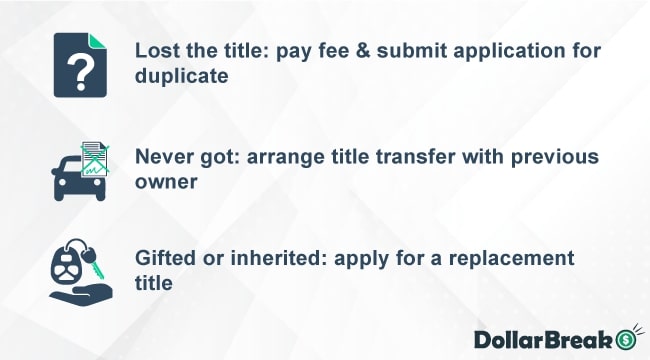
There are various methods to replace a misplaced title, particularly if you have it registered under your name or can present a bill of sale as evidence of ownership. However, if the title was never transferred to your name, you will need to take additional steps to obtain a duplicate title.
If You Lost the Title Document
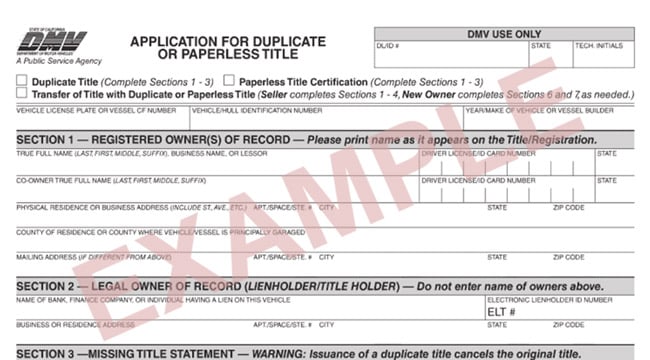
If the vehicle’s ownership was assigned to you upon purchase but you have lost the title document, you can straightforwardly apply for a duplicate title in person at your local DMV or by filling out a form online.
Here’s how to apply for a duplicate title:
- Provide your driver’s license or ID, the VIN number, and the license plate number of the vehicle.
- Pay a fee for the duplicate title. The fee will vary from state to state, but it is typically around $20-$50.
- Double-check if the information is correct and submit the application
You will get your Certificate of Title via mail within 2 to 4 weeks.
If You Never Got the Document
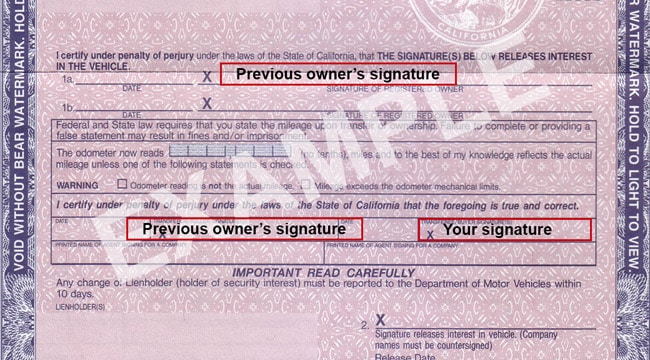
It is possible that you purchased a vehicle without the title or that the title was never transferred to your name due to incorrectly filed documents, the seller’s mistake, inheritance, or the vehicle being gifted to you.
If this is the case, your first course of action should be to reach out to the previous owner, clarify the issue, and request that they assist in completing the title transfer application.
If the previous owner has lost the title document, they will need to apply for a duplicate title first.
If Car Was Gifter Or Inherited
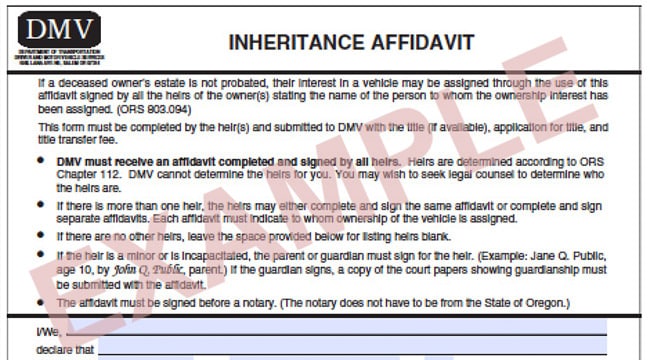
If you received a car as a gift or inherited it and you do not have a title in your name, you have a few options.
Option 1: Ask the rightful owner to transfer the title to your name. This is the most common and easiest option. You should follow a standard title transfer procedure at your local DMV.
Option 2: Apply for a replacement title. Provide proof of ownership, such as an inheritance document and depending on your state, you will receive the replacement title within a few weeks. A fee of $15 to $40 may apply.
Option 3: If the previous owner is not alive, you will need to provide a death certificate and will prove that you are the rightful owner of the vehicle. You will also need to apply for a title transfer by filling out the required forms at the DMV.
In all cases, you will be responsible for registering and insuring the car using the new title with your name. Receiving a new title usually takes up to a few weeks.
If You Can’t Get Title Obtain a Lost Title Bond
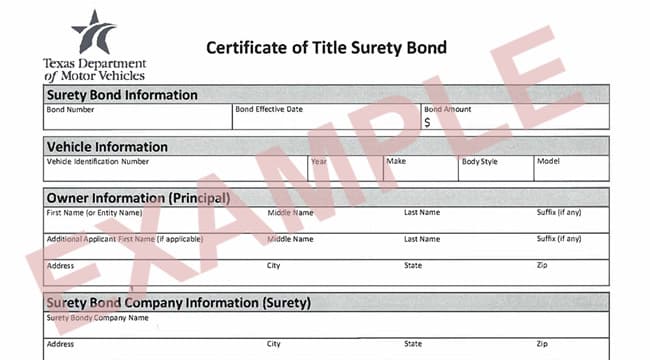
As a last resort, you can apply for a bonded title. It establishes who owns a vehicle and can be used instead of a traditional title to register, get insurance, or sell the car.
To get a bonded title, you must pay a surety bond, which is a type of insurance that protects the state and any potential previous owners if someone else claims ownership of the vehicle. The amount of the bond depends on the value of the vehicle.
Pros:
- It allows you to register, get insurance, and sell a vehicle even if you don’t have a traditional title.
- It is a relatively inexpensive way to obtain a title.
Cons:
- The bond amount may be high, depending on the value of the vehicle.
- The bonded title will not be transferred to the new owner when you sell the vehicle.
- You may have difficulty getting a loan or financing for a vehicle with a bonded title.
Why Car Title is Important?

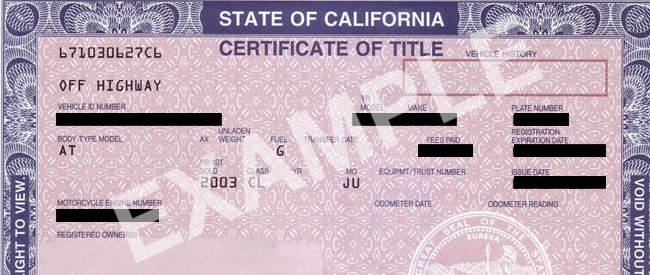
Certificate of Title or simply put, title, is a legal document issued by a state’s Department of Motor Vehicles (DMV) that establishes a person as the legal owner of a car.
The car’s title contains important information, such as the vehicle’s identification number (VIN), the year, make and model of the car, and the name and address of the registered owner.
This document is essential to prove the ownership and is used to:
- Register the vehicle with the DMV
- Sell the vehicle
- Apply for a loan
- Insure the vehicle
- Proof of ownership in case of legal issues or accident
If you have a loan on a car, your name will appear on the car title as the registered owner, but the lender will be listed as the lienholder, and until the loan is paid off, the lienholder may hold onto the title.
Once the loan is fully repaid, the lender will release their lien, often by providing a lien release document, and you can then apply to the DMV to obtain a clear title that shows only your name.
Best Way to Sell a Car
The best way to sell a car depends on multiple factors: the value of your car, current market demand and how much time you are willing to spend.
Selling Car Privately
Even though the exact time depends on multiple factors, such as the car’s make, model, age, mileage, condition, price and even your location, it takes 52 days on average to make a sale.
Moreover, you will need to spend at least 15 hours of your time advertising, scheduling test drives, answering potential buyer’s questions and taking care of all the paperwork.
If your car’s market value and demand is high it is likely you will make a sale quicker and it would be wise to sell it privately.
Trading in or Selling to a Dealership
Selling your car to a local dealership can be a relatively speedy procedure, typically taking about 1-2 days. However, the downside is that this approach requires you to invest time in visiting various dealerships to secure the best offer. This can become challenging, particularly if the number of dealerships in your vicinity is limited.
If you are considering trading in, the advantage is saving on sales tax. In this case, sales tax is counted as the purchase price and trade-in difference.
For example, if you are buying a new car for $20,000 and your trade-in is worth $5,000, you will only pay sales tax on $15,000. This is a savings of 3%, or $450 if the sales tax rate in your state is 7%.
However, in some states, sales tax is calculated on the full purchase price of the new vehicle, regardless of the trade-in value.
States where sales tax is calculated from full price:
- Hawaii
- Iowa
- Maryland
- Mississippi
- New Hampshire
- North Carolina
- Ohio
- Pennsylvania
Required Paperwork to Sell a Car
The specific paperwork required to sell a car varies by state, but the Certificate of Title is universally required. This document serves as legal proof of ownership and must be signed by the seller and buyer.
In addition to the title, some states may require other documents, such as a bill of sale, valid emissions test, and car registration documents. It is also a good idea to have a VIN check, service records, and owner’s manual, as these can help you prove the car’s value and get a better deal.
| Status | Document: | Document: | Document: |
|---|---|---|---|
| Required in All States | Certificate of Title | Odometer Reading | Release Of Liability |
| Required in Some States | Bill of Sale | Registration Tag | Emissions Test |
| Optional Paperwork | Vin Check | Service Records | Owner’s Manual |



